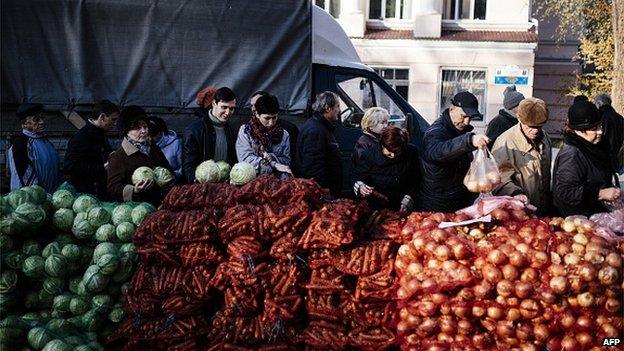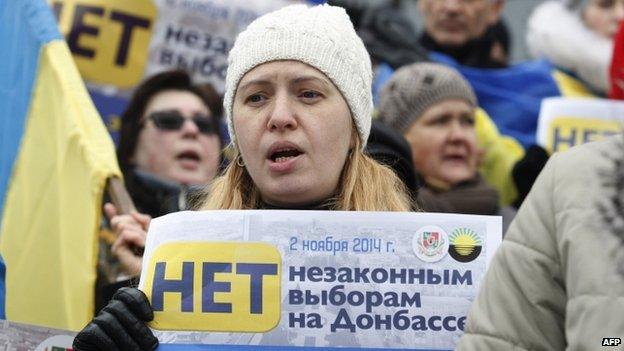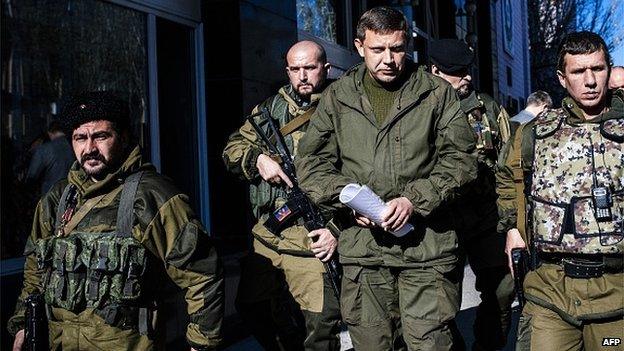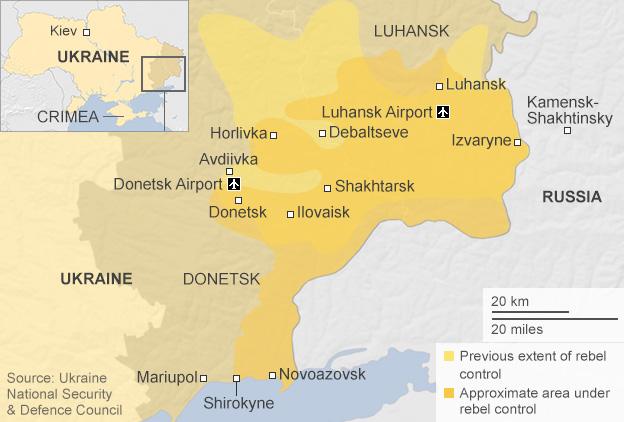Ukraine crisis: Separatists hold controversial polls
- Published
Laura Westbrook: "The two front runners are already acting leaders in each region"
Pro-Russian separatists in eastern Ukraine have held elections denounced by the West as "illegitimate".
The elections were held in the two self-proclaimed people's republics in the Donetsk and Luhansk regions.
The rebels say that early results suggest the two current separatist leaders are set to win in their regions - collectively known as Donbas.
Ukraine, the US and EU said they would not recognise the elections but Russia has given its support to the polls.
At least seven Ukrainian soldiers have been killed since Friday amid intensified clashes in the region.
On Sunday sources told the BBC that a huge convoy of up to 90 military trucks had been seen passing through rebel held areas of eastern Ukraine.
The convoy, which bore no military insignia, was carrying multiple rocket launchers and other weapons.
It came as the Ukrainian military reported an "intensive deployment" of troops and equipment crossing the border from Russia into the east of the country through the area of the border currently under rebel control.
Parts of the Donetsk and Luhansk regions fell to separatists after months of fighting in eastern Ukraine that ended with the Minsk ceasefire deal in September.
Rebel leaders said that as independent states they were not required to observe Ukrainian law, and therefore did not participate in Ukraine's national elections last week.

Voters bought vegetables as they queued at the polls in Donetsk on Sunday

Protesters in Kiev - many of them refugees from Donbas - denounced the rebel-held elections in the east
They said three million ballots had been printed for the polls, which would provide for directly elected heads of the regions and parliaments.
"These elections are important because they will give legitimacy to our power and give us more distance from Kiev," Roman Lyagin, election commission chief of the Donetsk region, told the AFP news agency.
US 'deplores' polls
But Western leaders and ministers in the capital Kiev said the territories must abide by the truce, which was agreed with Russia, and hold local elections under Ukrainian law in December.
Ukrainian President Petro Poroshenko called Sunday's polls "a farce" and "a clear violation" of the Minsk deal.
Meanwhile, the White House said in a statement, external on Friday: "We deplore the intent of separatists in parts of eastern Ukraine to hold illegitimate so-called local 'elections' on Sunday."

Alexander Zakharchenko, the acting head of government in Donetsk, is tipped to become the regional head
However, Russian President Vladimir Putin has said the Minsk deal provided for elections "in co-ordination with, not in line with" Ukrainian plans.
Alexander Zakharchenko, the prime minister of the self-declared government in Donetsk, has won more than 70% of the vote and is set to become the region's head, the rebels say quoting early results.
Mr Zakharchenko's party is also winning in the parliamentary poll.
Meanwhile, Igor Plotnitsky, the prime minister of the self-declared government in Luhansk, has secured more than 60% of the vote.
But the elections come amid continuing violence in eastern Ukraine.
A spokesman for Ukraine's army said on Saturday that seven soldiers had been killed and 10 wounded during 24 hours of fighting across the breakaway regions.
Meanwhile, rebel commanders in eastern Ukraine told the BBC they had conducted a "people's trial" of two alleged rapists in the city of Alchevsk in the Luhansk region.
One of the accused was sentenced to death after a show of hands among the 300 locals who took part, they said, while the other was sent to "die with honour" by fighting on the front line.
At least 3,700 people have been killed in fighting since armed separatists took over government buildings in Donetsk and Luhansk in April.

